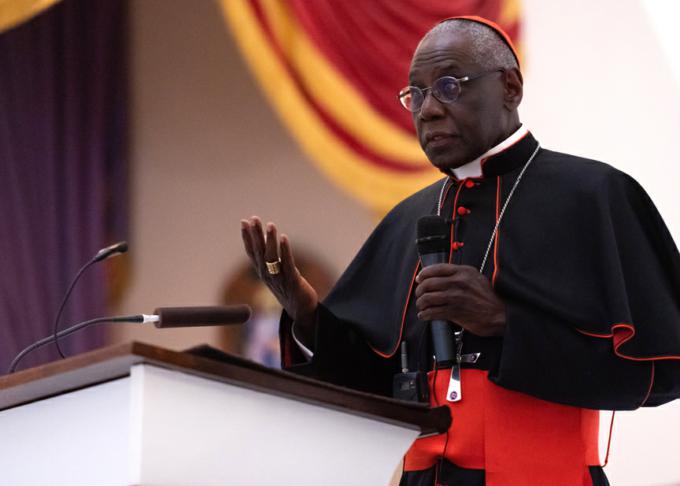
Culture
Without being rooted in God, no real happiness and freedom are possible.
It would be easy to start 2023 with a healthy dose of cynicism. As we start the new year, Christmas lays out to the world what it really needs. How easy it is to overlook the creche as the source of all lasting change. The infant savior turns the world's priorities upside down. His poverty and silence point to the passing nature of the world and the eternal insignificance of most of our concerns. There is only one thing necessary, and it is him. Jesus is the prince of peace, who brings order to the world, though not at once. He works his liberation in our hearts, one at a time.
After watching all the usual Christmas movies again -- "It's a Wonderful Life," "Charlie Brown's Christmas," versions of Dickens' "Christmas Carol," "The Grinch Who Stole Christmas," and even "Elf" -- I realized that they all narrate the same essential story. Using Christmas as an example, they tell us that we have taken life's true meaning for granted. Recovering it changes priorities, particularly moving away from accumulating wealth, the endless desire to "win money, money, money," and a commercialization of what should be holy. Money, the films all seem to relate, no longer has the same meaning; it no longer constitutes life's driving force. God wants to change us even more than these characters. The transformation of these fictional characters provides a secular reminder of the real change that can happen in us. We can become saints. We can use our work, earthly possessions, and relationships for God's glory and the happiness of others.
Like Scrooge on Christmas Eve, it helps to have a guide. One of the best I have discovered for the spiritual life today is Cardinal Robert Sarah from Guinea, Africa, who worked in the Vatican Curia from 2001 to 2021. His trilogy of interview books with Nicholas Diat are required reading: "God or Nothing," "The Power of Silence," and "The Day Is Now Far Spent" (all from Ignatius Press). Following the path of the late Pope Benedict XVI, Cardinal Sarah has been a champion of a liturgical spirituality, putting the worship of God before all else. His new "Catechism on the Spiritual Life" (EWTN, 2022) showcases this approach by organizing its teaching around the seven sacraments.
Cardinal Sarah describes this liturgical and sacramental vision as a mystical conformity to Christ: "Christian life, indeed, as all Tradition testifies, is above all an imitation of Christ. In order to make us enter into communion with the mysteries of His own life, Jesus left us the sacraments, which will be like signposts as we follow him on our journey. The sacraments are indeed for us, as St. Josemaria Escrivá puts it, 'the source of divine grace and the marvelous manifestation of God's mercy toward us'" (14). The spiritual life changes us in an ongoing path of conversion as we become more like Christ in letting go of our attachments and embrace his life more deeply.
The cardinal elaborates further on this process of conversion as an exodus, a kind of itinerary we each must follow through the sacramental life: "This liberating journey that the book of Exodus relates for us prefigured the interior voyage that every Christian is called to make over the course of his life. For God takes His time to conquer our hearts to prepare them for the New Covenant with him" (7). He continues the exodus theme throughout the book, looking at how the sacraments bring us to true freedom. Reflecting on the absolute necessity of the worship of God, despite any attempts by government to curtail it, Cardinal Sarah affirms the call to come out from pharaoh's dominion to the freedom of worshipping God: "The protracted 'arm wrestling' between Pharaoh and Moses recounted by the book of Exodus deals precisely with freedom of worship, a precept that depends on God alone and connect be the object of any compromise" (60).
Without being rooted in God, no real happiness and freedom are possible. As the cardinal points out, the true transformation we need is to move from a life of sin to communion with the Holy Trinity: "We will never be able to live our Christian life fully unless we let God free us from our sin, as He brought His people out of enslavement in the land of Egypt -- and to let Him do this so as to conform our human existence to the very life of the Trinity, so as to make us thereby participants in the divine nature through a resemblance to the Son of God" (141).
Christmas resonates so strongly because we all desire love, happiness, joy and peace. The season conjures these emotions, but commercialized stories cannot deliver what they promise. They point to the possibility of change, of marking a new start, but Cardinal Sarah leads into the real source of this desired change -- not a vague spirit of Christmas, but the one born to save us from our sin, who will lead us to the true promised land.
Recent articles in the Culture & Events section
-
'Dignitas' and the mediaRussell Shaw
-
Scripture Reflection for April 14, 2024, Third Sunday of EasterDeacon Greg Kandra
-
St. Helena's House is established in the South EndThomas Lester
-
Is this synodality?Russell Shaw
-
Poking the hornet's nest of IVFFather Tadeusz Pacholczyk


















